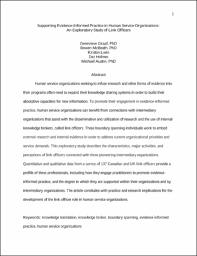
ATTENTION: The works hosted here are being migrated to a new repository that will consolidate resources, improve discoverability, and better show UTA's research impact on the global community. We will update authors as the migration progresses. Please see MavMatrix for more information.
Show simple item record
| dc.contributor.author | Graaf, Genevieve | |
| dc.contributor.author | McBeath, Bowen | |
| dc.contributor.author | Lwin, Kristin | |
| dc.contributor.author | Holmes, Dez | |
| dc.contributor.author | Austin, Michael | |
| dc.date.accessioned | 2019-07-08T19:43:03Z | |
| dc.date.available | 2019-07-08T19:43:03Z | |
| dc.date.issued | 2016 | |
| dc.identifier.citation | Graaf, G.,McBeath, B., & Austin, M.J. (2017). Supporting evidence-informed practice in human service organizations: An exploratory study of link officers. Human Service Organizations:Management, Leadership & Governance, 41(1), 58–75. https://doi.org/10.1080/23303131.2016.1192575 | en_US |
| dc.identifier.issn | 2330-3131 | |
| dc.identifier.uri | http://hdl.handle.net/10106/28289 | |
| dc.description | This is an Accepted Manuscript of an article published by Taylor & Francis in Human Service Organizations:Management, Leadership & Governance on June 2016, available online: https://www.tandfonline.com/doi/full/10.1080/23303131.2016.1192575 | en_US |
| dc.description.abstract | **Please note that the full text is embargoed** ABSTRACT: Human service organizations seeking to infuse research and other forms of evidence into their programs often need to expand their knowledge sharing systems in order to build their absorptive capacities for new information. To promote their engagement in evidence-informed practice, human service organizations can benefit from connections with intermediary organizations that assist with the dissemination and utilization of research and the use of internal knowledge brokers, called link officers. These boundary spanning individuals work to embed external research and internal evidence in order to address current organizational priorities and service demands. This exploratory study describes the characteristics, major activities, and perceptions of link officers connected with three pioneering intermediary organizations. Quantitative and qualitative data from a survey of 137 Canadian and UK link officers provide a profile of these professionals, including how they engage practitioners to promote evidence-informed practice, and the degree to which they are supported within their organizations and by intermediary organizations. The article concludes with practice and research implications for the development of the link officer role in human service organizations. | en_US |
| dc.language.iso | en_US | en_US |
| dc.publisher | Taylor & Francis | en_US |
| dc.relation.ispartofseries | Human Service Organizations:Management, Leadership & Governance; | |
| dc.subject | knowledge translation | en_US |
| dc.subject | knowledge broker | en_US |
| dc.subject | boundary spanning | en_US |
| dc.subject | evidence informed practice | en_US |
| dc.subject | human service organizations | en_US |
| dc.title | Supporting Evidence-Informed Practice in Human Service Organizations: An Exploratory Study of Link Officers | en_US |
| dc.type | Article | en_US |
Files in this item
- Name:
- Link Officers.pdf
- Size:
- 526.2Kb
- Format:
- PDF
- Description:
- PDF
This item appears in the following Collection(s)
Show simple item record


